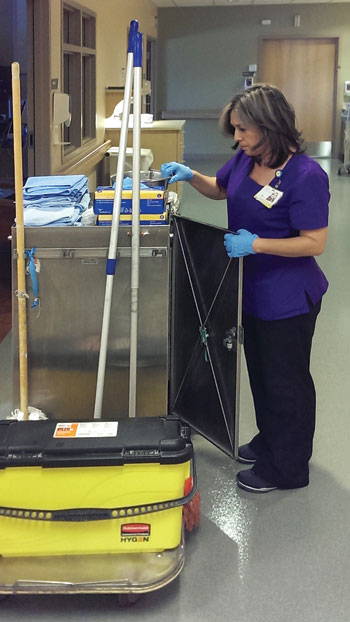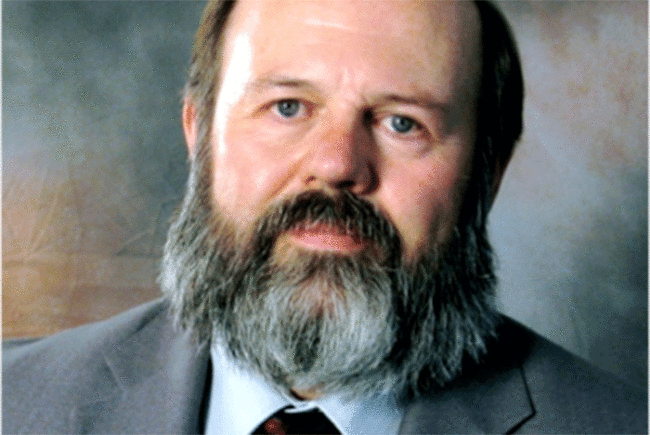About this seriesThis series of tutorial articles is a joint project of the Association for the Healthcare Environment and Health Facilities Management. |
It's not unusual for environmental services (ES) managers to oversee additional services and functions that supplement the core task of cleaning their facilities. Along with the added time commitments, they also must provide improved quality and cleanliness results associated with the HCAHPS comparison and improvement process.
However, there are key proficiencies to ensure that health care ES work is performed in a cost-effective and operationally effectual manner. Mastering some key areas will keep an ES manager on the road to sustained success.
Five categories
Effective health care ES departments weave the following areas together and manage them successfully to thrive in today's challenging environment.
Knowledge. Knowledge is the foundation to building an effective ES organization. A manager may possess many traits for success such as passion, team-building and financial acumen. However, without a strong knowledge of industry tenets, a manager can spend too much time chasing success from behind and never be in a position to lead.
The Association for the Healthcare Environment (AHE) has developed and offers core ES management training courses that are focused on providing managers with the best practices, understanding and technical expertise available in the industry. These reflect the understanding and knowledge required within ES.
Through their various publications, webinars, website and conferences, a manager not only can gain the indispensable understanding of the ES work processes, but also can obtain the Certified Healthcare Environmental Services Professional certification, which is the profession's indicator of achievement regarding specialized educational understanding of health care ES.
Some of the key topics and knowledge areas an ES manager will need to acquire include:
• Health care departmental finance. This means developing a thorough understanding of health care departmental finances through monitoring and analysis of the departmental operating report, including familiarity with both the operational and capital budgeting processes.
• Leadership and management. This calls for developing key and strategic relationships within the specific department as well as hospitalwide. These relationships not only help the ES department network and build success with the executive-level management team, but also can be used to motivate staff and develop effective disciplinary corrections.
• Facility awareness. Knowing what comprises a facility is essential to a manager's success. Knowing cleanable square footages, the various types of surfaces within the total square footage, patient census and volumes, types of acuity and associated care within those spaces and ongoing remodeling or construction work that is taking place, are key to developing productivity schedules that will balance against demands.
• Infection prevention. Understanding the life cycle of microorganisms, the eradication of these microorganisms through the disinfection process and the reduction and elimination of health care-associated infections is paramount.
• Green cleaning. This includes knowledge and use of ecofriendly chemicals and equipment that also are effective as cleaning agents. Additionally, ES managers should be familiar with such new technology as ultraviolet disinfection that does not introduce harmful elements into the patient environment.
• Supply purchasing awareness. This means utilizing the right products for the right job functions, understanding group purchasing organization relationships with hospital purchasing departments, employing vendor relationships for training and knowledge of inventory management practices and control.
• Staffing and labor modeling. ES managers must be able to utilize industry productivity standards to establish duty and task lists. This includes establishing team or zone cleaning assignments to take advantage of space proximity and combined work efforts.
• Quality. Monitoring and analyzing quality results from third-party surveyors, internal quality surveys and HCAHPS surveys with associated implications for the department and the hospital are important skills for ES managers.
• Regulations. Requirements, standards and expectations from governmental regulatory agencies overseeing safety in the health care environment must be kept in mind. Knowledge of key agencies such as the Joint Commission, Centers for Medicare & Medicaid Services, health departments, the Occupational Safety and Health Administration and the Department of Transportation are essential.
• Patient engagement. This means understanding that all of the efforts of the ES manager and staff have as their primary focus an environment in which the patient is able to heal physically, emotionally and spiritually. Not only must ES professionals provide a clean and sterile setting, but also should aid in the healing process when they interact with patients.
• Linen. When linen and laundry services fall to the ES department, it is incumbent upon managers to develop education and understanding of industry metrics and benchmarks to ensure efficiency of delivery as well as key knowledge of products, inventories, par levels and utilization.
Organization. Knowledge provides ES managers with the individual pieces of understanding they need to be successful. Effective ES management means putting those pieces of the puzzle together to create an ideal picture.
 |
|
ES managers must keep a keen eye on supply tracking and utilization. Photo courtesy of Soriant Healthcare |
An ES manager who scrambles to pull information from this pile or that drawer, fumbles with stacks of papers and calls on his or her assistant for repeated help is showing signs that there is a level of chaos in the facility with respect to ES.
ES managers encourage housekeepers to maintain their carts in a neat and organized fashion so that they instinctively know where to find what they need, and can work efficiently. It is incumbent on the managers to be organized similarly.
As ES managers look at their departments, they should ask themselves if they have the following items in files, folders or in locations that can be accessed to review, edit or assess as needed:
• Facility square footage assessment detail. This is a unitization of the facility measured by time and workload needs. A related folder should contain task list assignments for the various work stations.
• Master on-off work schedules. These schedules, from which ES managers can build posted work schedules, are indispensable. From these schedules, ES managers can establish productivity reports showing worked hours per metric, such as square footage or patient day.
• Floor schedules. These should be organized into daily, weekly, monthly, quarterly or annual frequencies so that floor teams know what they will be doing each day. ES managers also must ensure that all hospital locations are scheduled on an appropriate rotation. Linked to the floor schedules should be the department capital equipment lists. Additionally, there should be an equipment maintenance log with running cost per device and an equipment sign-out log.
• Employee files. These are not the official human resources files, but departmental records that might include training, awards or accomplishments.
• Quality records. These files include HCAHPS third-party survey scores, internal inspections with results of such tracking items as adenosine triphosphate readings and fluorescent light evaluations.
• Supply tracking and utilization. This is documentation showing a maintained supply inventory from which the ES manager is able to order weekly supplies without ever needing to go into the supply room to count. Closely related are supply usage reports that measure utilization per metrics like patient days or full-time equivalent employees.
• Waste usage reports. These are reports showing costs and poundage that are measured per such metrics as patient days and pounds. These reports should be developed for each aspect of the waste stream to include regulated, municipal, pharmaceutical, sharps, hazardous materials and recyclables such as cardboard, paper and plastics.
• Purchasing contracts. There should be a copy of any contract the department oversees such as window washing, pest control, matting, uniforms or cleaning services. In conjunction with these contracts, there should be a report for each service with costs tracked per month as well as copies of ongoing invoices.
• Departmental financial reports. These measure results against the budget.
Finally, if the department also oversees linen and laundry operations, the ES manager will want to make sure he or she has access to linen poundage and utilization reports, census reports showing patient days per nursing unit or outpatient activity per area, and adjusted patient days for the hospital overall. If linen services are outsourced, the linen vendor contract should be maintained along with ongoing linen provider invoices.
This information can seem a bit overwhelming at first. ES managers can make it easy on themselves by developing a check-off sheet each month to track each of the identified areas. They also should schedule a few hours each week to organize, process and review the data and analytical information so they can use it to drive efficiencies.
Relationships. Relationships are a hidden secret to ES success. In any organization, it is almost impossible to be successful alone. Productive ES departments often work together as a team and these internal relationships drive positive outcomes. However, there also are strategic relationships outside of the ES department that can be helpful and beneficial to the overall success of the department.
Fundamental relationships can be cultivated in every organization. The secret is finding out who the decision-makers are. When ES managers are asked their opinions on how to accomplish something, they should use this to their advantage by getting organizational leaders invested in the ES department's goals and what it is working on. Of course, an ES manager also should be sensitive to an organizational leader's time and willingness to engage.
Mentors are perhaps the most useful relationships that exist. Many ES professionals can track success or progress in their careers to a handful of individuals with whom they developed different levels of relationships and shared secrets of success. Some of the toughest bosses turn out to be the best mentors. If an ES manager gets a tough boss, he or she should take advantage of the learning opportunity and cultivate the relationship.
Engagement. Engagement, otherwise known as enthusiasm, is the engine that takes all of the key pieces and moves them forward. If a facilities professional is the type of leader who likes to push from behind, sit in an office and read reports that tell what happened last month, ES is most likely not the best fit. ES leaders have to possess an inherent passion for what they do. Early mornings to late evenings, walking 10 miles a day, resolving crises at every turn and touching every aspect of the department's processes are not for the timid or weak.
Full-throated engagement and enthusiasm will make up for some shortcomings. Not being afraid to get their hands dirty and work alongside employees will cause enthusiasm to rub off on others. Attending the annual AHE convention also will provide an opportunity for ES managers to spend time with hundreds of other like-minded, engaged and enthusiastic leaders who are fun to be with and passionate about what they do.
Leadership. Organizational skills and effectiveness grow and flourish under clear leadership. ES managers who have the ability to respond to and motivate their teams will provide a sense of composure and the assurance of support when assistance is needed.
As retired four-star General Colin Powell once observed, "The day soldiers stop bringing you their problems is the day you have stopped leading them."
Components for success
Through knowledge, organization, relationships, engagement and leadership, ES managers have the components necessary to manage a successful and effective department that can overcome all of today's health care challenges.
Rock Jensen is senior consultant at Soriant Healthcare, Milton, Ga. He can be reached at rock.jensen@sorianthealthcare.com.






